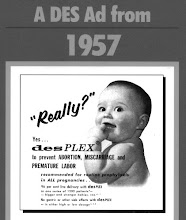 The UK newspaper The Independent (front page) today has raised awareness of the DES exposure problem for the benefit of UK's population. See:
The UK newspaper The Independent (front page) today has raised awareness of the DES exposure problem for the benefit of UK's population. See:http://www.independent.co.uk/life-style/health-and-families/health-news/thousands-of-women-could-be-at-risk-from-silent-thalidomide-6292889.html
This comprehensive article will no doubt encourage many DES-affected in UK, who have so far been unaware of the harm of DES, to seek information in helping prevent unfavourable health outcomes due to DES.
This article also highlights the latest US Court victory for DES daughters diagnosed with breast cancer and the possible legal opportunities for compensation by UK women so affected. Pleasingly, the article states that US DES lawyer, Aaron Levine, will travel to the UK in two weeks time to coordinate a hunt for the "DES daughters" in UK who have been unable to get compensation in British courts. There has been UK media follow-up on this:
http://topnews.us/content/245785-lawyer-hunt-des-daughters-uk
This interest by UK media has been sparked by the great work of Domino and supportive partner (Diethylstilbestrol, Journal of a DES Daughter). A ripple effect to reach and activate Australian media is needed...followed by the Australian "hunt for DES daughters".
NOTE: DES Action Australia-NSW appeals to all DES affected Australians to contact Australian media, newspapers, radio etc right now to tell them about the attention in US and UK, and the US court victory for DES daughters diagnosed with breast cancer.


